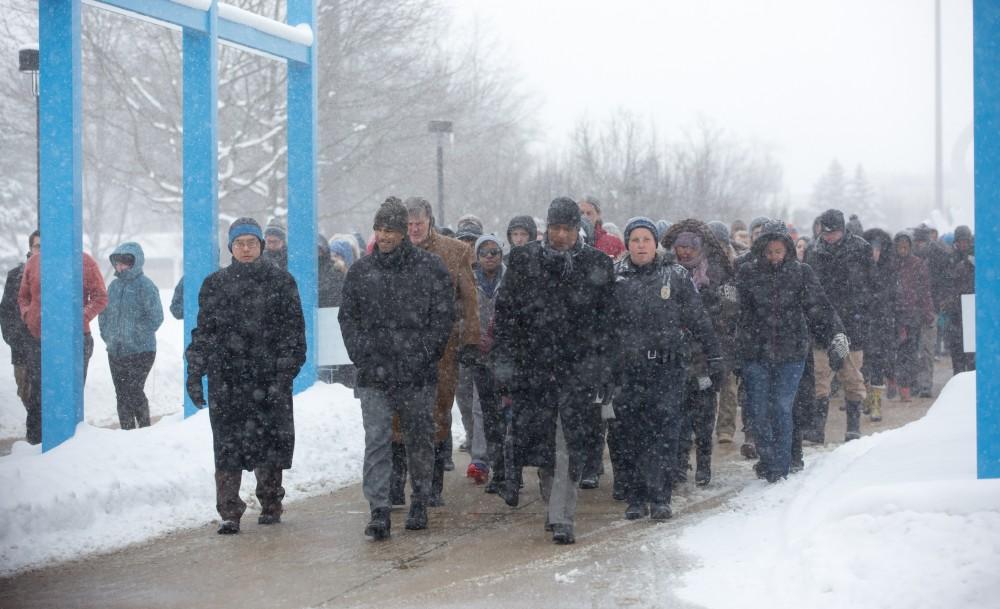Advocating for activism

GVL / Kevin Sielaff – Touré, Vice columnist and well known author, visits Grand Valley’s Allendale campus on a chilly Jan. 18, 2016. Hundreds of students gathered inside the Fieldhouse to listen to Touré’s keynote speech; the students also participated in a silent march before the event.
Jan 21, 2016
Every year for the past four years, Grand Valley State University has taken the third Monday of January off from classes to celebrate and memorialize Martin Luther King Jr.
King was more than a reverend or an activist. King has come to be known as the voice that led a generation through leagues of social change, still reminding people that the fight for equality is not over.
“Dr. Martin Luther King Jr. was a man whose words and actions continue to stir our consciousness,” said GVSU President Thomas Haas. “There are courageous people across this country, in our communities and on our campuses who are reminding us that this work is not done.”
To commemorate MLK Day this year, GVSU centered MLK Commemoration Week around activism. On Jan. 18, GVSU hosted Touré, a culture writer and social commentator, to give the annual keynote speech in the Fieldhouse Arena as more than 200 people watched.
When he first took the stage, Touré mentioned that he took part in the silent march from Zumberge Hall to the Fieldhouse and said that he was surprised to see so many people show up.
“We had a fantastic march,” he said. “It was cold, but I wasn’t thinking about the cold because there were hundreds of people behind us, farther than the eye can see, doing this with us. I felt quite inspired that such a large group was working together.”
Though inspired, he reminded the audience to keep in mind the events of recent months, drawing parallels between cases like Tamir Rice and Laquan McDonald and the events of King’s lifetime.
“This is surely a moment we could use King,” Touré said. “His moral power, his leadership, his guidance, would be critical at this moment because we have black people dying in the street from coast to coast. We, as a society, are having a hard time punishing those involved in many of these instances because we, as a society, do not truly believe that black lives matter.”
Touré commended the Black Lives Matter movement for being a highly visible tool, bringing awareness to many injustices that have happened in recent months.
Racism has become such a household topic that children are beginning to see the problem. Touré said he struggled to explain to his son that while everybody is equal, not everybody is treated the same after Eric Garner was killed by police.
“Why don’t the black bodies get the same kind of caution and discretion that these white bodies are getting?” Touré said. “That’s why black lives matter is so important right now. That’s why we have the saying ‘black lives matter.’ White lives matter is obvious.”
During his presentation, Touré asked many questions, but he focused on one that addresses the fundamental issues of racism today: In a society that privileges whiteness and only doles out injustice for all others, how does one demand justice for black bodies?
Fighting a deeply-held idea such as institutional racism is much more than hashtagging well wishes to families of fallen community members. Touré stressed the importance of combating educational, economic and legal systems that are set in place, because systemic racism “produces injustice such that the overwhelming majority of black bodies in the country have little chance to succeed.”
So, how does Touré hope to accomplish this type of institutional change?
He turned back to King to answer his questions and drive home what it means to be an effective activist.
“MLK said we must love our white brothers no matter what they do to us, we must make them know that we love them,” he said. “(King) met hate with love. A radical love, a powerful, revolutionary love that is not blind or naive, but a love that remembers and values the humanity of someone who is not ascribing that humanity to you.”
Nonviolence, Touré said, is much more than not fighting back when physically attacked. Leading a nonviolent movement is about emanating love for everyone around you regardless of who they are and welcoming them into a safe place.
“At the center of nonviolence stands the principle of love,” Touré said, quoting King. “When we are so moral and so dignified and so loving that we seem like we’re on another level, then we’ll attract other people to our side.”
Being part of a movement like Black Lives Matter, Touré said, is not just about loving others and bringing awareness to the everyday injustices that black people face. It’s also about taking part in other movements and not being exclusionary when people want to help and take part.
Injustice isn’t one singular problem that black people face and people don’t face different injustices – they’re all connected, Touré said. It’s an interconnected web, touching everyone in every part of society.
“Only by working together as a linked movement will we truly change America for the better,” he said. “On that, we can stand on the shoulders of King and try to make the world a better place.”





















